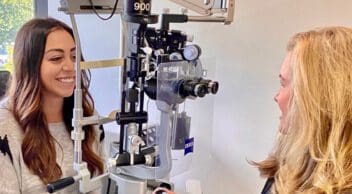How Long Does Glaucoma Surgery Take to Recover From?
Home / Diagnosed With Glaucoma /
Last Updated:
Glaucoma surgery is a relatively quick procedure that allows patients to return home the same day. Significant recovery occurs in the first days following surgery, while the full recovery timeline can be up to six weeks.
Table of Contents
Immediately following surgery, the eye will be covered, and you will be sent home with aftercare instructions and a prescription for eye drops. Over-the-counter pain medications can be taken to address mild pain and discomfort.
The day after surgery you should have your first follow-up appointment. While bathing is fine, you should avoid getting water in your eyes, driving, reading, and bending over.
In the first weeks after surgery, continue to take it easy. Administer eye drops as directed by your doctor. Avoid activities, such as heavy lifting, that could put extra pressure on your eyes.
Recovery from glaucoma surgery is normally straightforward, though potential complications, such as the development of cataracts or problems with the cornea, can delay recovery and require treatment.
For most people, their vision returns to how it was prior to surgery. For some, vision improvement or loss can require updates to their glasses or contact lens prescriptions.
Glaucoma surgery does not cure glaucoma, so ongoing treatment and management are required. Postoperative eye drops can be taken for up to three months followed by ongoing glaucoma medication.
Recovering From Glaucoma Surgery

For anyone who recently underwent glaucoma eye surgery, a recovery period is to be expected. The surgery is typically done on an outpatient basis, so you can go home the same day. Precautions must be made at home to allow the eye time to heal.
For most people, a significant amount of recovery happens in the first days following surgery. The eyes feel better almost immediately, though a full recovery may take up to a month or so.
You deserve clear vision. We can help.
With 135+ locations and over 2.5 million procedures performed, our board-certified eye surgeons deliver results you can trust. Your journey to better vision starts here.
If glaucoma surgery is necessary in both eyes, your eye doctor will only operate on one eye at a time. The first eye is given time to heal before operating on the second.
While surgery is an effective treatment option, the National Eye Institute (NEI) explains that glaucoma surgery does not cure glaucoma or reverse any vision loss that has already occurred. It does protect your vision and prevent glaucoma from making it worse. Once a full recovery is made, you can expect your vision to return to how it was prior to surgery.
Immediately Following Surgery
Right after surgery, the eye that was operated on may be red and irritated. Inside the eye, a small blister-like bump, called a bleb, forms over the surgically created hole. This bump is covered by the eyelid and typically not visible or painful.
To ensure the success of the surgery, the following steps are made immediately following surgery:
- The eye is covered with a padding or shield to protect from external injury until the first follow-up appointment the next day.
- Anti-inflammatory eye drops are prescribed to be used every one to two hours for the first few days, and then four to six times per day for up to two to three months.
- Nonsteroidal anti-inflammatory drugs and acetaminophen can be used to control mild pain and discomfort.
Someone will need to drive you home from the surgery, as some initial blurry vision is to be expected. Blurry vision caused by the surgery should resolve on its own over time.
The First Few Days After Surgery

You can expect the eye to be sore and possibly swollen for the first few days after glaucoma surgery. It is important to avoid certain activities that could cause particular strain or put pressure on the eyes during this time.
Avoid these activities:
- Driving
- Reading
- Bending over
- Heavy lifting
Avoid getting water into the eye for at least one week following surgery in order to reduce the risk of infection. You can bathe or shower in the first days after surgery, as long as you are careful not to touch the eye or get any water or soap in it.
Within the first few days following surgery, you should have your first follow-up appointment. Your doctor will evaluate your eye pressure and assess for signs of infection or inflammation.
The First Weeks After Surgery
In the weeks following glaucoma surgery, it is important to monitor your level of physical activity. While it is safe to resume many of your normal activities, certain actions should be avoided, such as heavy lifting for two to four weeks.
You should be particularly cautious about when you return to driving, as vision can remain blurry for up to six weeks following surgery.
Be responsible about administering your eye drops regularly, as directed by your eye doctor. You will likely need to do this for many weeks in order to achieve the best possible results from your surgery.
You deserve clear vision. We can help.
With 135+ locations and over 2.5 million procedures performed, our board-certified eye surgeons deliver results you can trust. Your journey to better vision starts here.
Potential Complications That Can Delay Recovery Timeline
As with any procedure, glaucoma surgery can have negative side effects, explains NEI. During the recovery period, it is important to be vigilant about attending all postoperative checkups so that your doctor can identify any complications and treat them promptly.
These are potential risks of glaucoma surgery:
- Cataracts
- Problems with the cornea
- Failed bleb
- Vision loss
- Eye pressure that is too low
If the above complications arise, it can delay your recovery time. Fortunately, you should have multiple appointments with your eye doctor following surgery. They will check that your eye is healing well and that the pressure in the eye is not too low or too high.
Modifications Required After Glaucoma Surgery
The Glaucoma Research Foundation (GRF) explains that some modifications may need to be made following glaucoma surgery. Typically, vision returns to how it was prior to surgery, but some people experience improved vision. Likewise, eye pressure that is too low following surgery can lead to worse vision.
For people who experience vision changes after glaucoma surgery, updates may need to be made to their glasses or contact lens prescriptions.
Special care must also be given to the bleb that formed as a result of surgery. For patients who wish to wear contacts, the newly formed bleb can make contacts fit oddly and increase the risk of infection.
If other vision complications, such as cataracts or cornea problems, develop as a result of surgery, additional modifications and treatment may be required.
Ongoing Treatment & Recovery
The recovery period six weeks after glaucoma surgery and beyond is referred to as long-term postoperative care, explain experts from Community Eye Health Journal. Everyone responds to surgery differently and recovers on slightly different timeframes, but the majority of the recovery period should be completed by six weeks.
The surgery does not cure glaucoma, so ongoing treatment is necessary. Regular checkups with your eye doctor every three to six months may be recommended.
Postoperative antibiotic or steroid eye drops may be prescribed for up to three months. Your eye doctor may also prescribe anti-glaucoma medication on an ongoing basis to keep your eye pressure at a safe level.
Additional steps you can take to support healthy vision, such as wearing protective eyewear and optimizing your vision through up-to-date prescriptions, will support the successful ongoing management of your glaucoma.
You deserve clear vision. We can help.
With 135+ locations and over 2.5 million procedures performed, our board-certified eye surgeons deliver results you can trust. Your journey to better vision starts here.
References
- Glaucoma Surgery. (June 2019). National Eye Institute.
- Incisional Surgery. (January 2017). Glaucoma Research Foundation.
- Glaucoma Surgery. John Hopkins Medicine.
- The Basics of Good Postoperative Care After Glaucoma Surgery. (2016). Community Eye Health Journal.
This content is for informational purposes only. It may have been reviewed by a licensed physician, but is not intended to serve as a substitute for professional medical advice. Always consult your healthcare provider with any health concerns. For more, read our Privacy Policy and Editorial Policy.